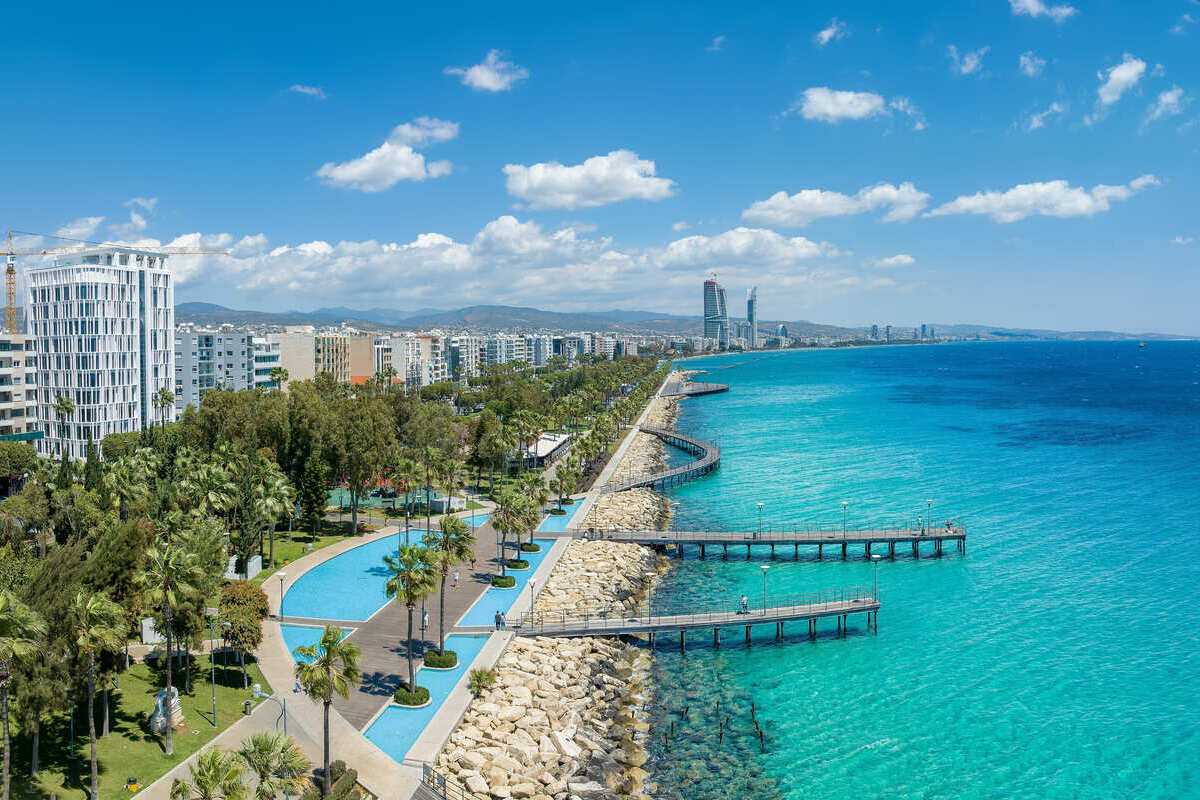
Underrated Digital Nomad Paradise In The Mediterranean (Cheaper Than Italy & Spain!)
Last Updated
Famous for their fascinating history and year-round warmer weather––perks of being in the Mediterranean basin––Italy and Spain are two of the most sought-after destinations for digital nomads across the pond, but they’re not exactly easy on the wallet.
Though living costs vary dramatically between different cities, on average, living in Italy will set you back $4,164 per month, while monthly expenses in a major Spanish city like Barcelona, one that sunseekers flock into, reach as high as $4,608.


That dolce vita comes at a cost, sometimes an exorbitant one if you’re a nomad who’s just getting back on your feet, but it doesn’t have to be that way: there are far cheaper options in the Med, where you can have both beach and culture without sacrificing comfort.
If you love beach and culture, lesser-known Cyprus is the digital nomad paradise you’ve been praying to the (Greek) gods for:
Where Is Cyprus Even?


Tucked away in the eastern end of the Mediterranean, with the likes of Türkiye, Lebanon and Syria as closest neighbors, Cyprus is an island nation often missed altogether by digital nomads country-hopping across the pond:
Despite being geopolitically European, and a member of the European Union, it’s hundreds of miles away from the European mainland, and unless you’re enthusiastic about complex, days-long ferry journeys, the easiest way there is flying.
While there are no direct flights from the U.S., nearly all major European hubs have direct flights. Explore them on Google Flights here.
The official languages are Greek and Turkish, though a majority of Cypriots speak Greek as their mother tongue, particularly in the South, the local currency is the euro (though the Turkish lira is in use in the overwhelmingly-Turkish North) and it’s rarely not balmy out.


Like any other Mediterranean island, Cyprus is known for its Greco-Roman heritage, with a host of historic port cities and archeological sites dating back thousands of years, postcard-perfect beaches lapped by teal-colored waters, and incredible weather.
For decades now, it’s somewhere Europeans have flocked into to escape their damp autumns or freezing winters: being in proximity of the Middle East, Cyprus enjoys year-round warmer temperatures, reaching as high as 78°F as late as October.
For digital nomads, Cyprus is the promise of something far greater: it is, of course, the perfect destination for beating the winter blues, but to remote workers, the higher quality of life (usually at more affordable prices) is the bigger draw:
Cyprus Can Be More Affordable Than Italy Or Spain


Though Cyprus is a euroized country, meaning it uses the euro as its official currency, life on the island can be much cheaper than in your average Western European country, like France or Italy. Compared to the United States, it’s unbelievably inexpensive.
As always, there are levels to it, as bougie nomads staying in oceanfront villas in touristy Ayia Napa and going for dinner in five-star restaurants will likely spend (a lot) more, but if you’re keen on keeping it within a reasonable budget, there’s no need to go all frugal about it, either.


Renting an Airbnb in Nicosia, the capital of Cyprus, will set you back a minimum $1,060 per month, while sublets in Larnaca, within driving distance of the sea, cost $1,037 monthly: we’re talking fully-furnished flats with thoughtful touches, work stations and even balcony views.
There are more expensive properties, but only if you’re willing to pay more for outstanding stays: as Numbeo confirms, the average one-bedroom rental in Nicosia, Cyprus is $1,053 a month, around 35.6% lower than Rome, and a whopping 57.5% lower than Paris.
Great Quality Food At Reasonable Prices


Food and transportation are also reasonably cheap: again according to Numbeo, a meal at an inexpensive restaurant––potentially a gyros with fries for side and a soft drink––will cost you $16.38 on average, or the equivalent in euro.
Staying in the North, a region controlled by Turkish forces that uses the far weaker Turkish lira as currency, consumer prices are even cheaper: you shouldn’t be surprised kebabs are priced $5-7 in North Nicosia or Girne/Kyrenia, 57% cheaper than gyros in the South.


At more high-end restaurants, a three-course dinner in the Greek-speaking South will still only cost you $65.53 (for two people), and in the North, that’s $49.15; overall, monthly expenses can be as low as $3,044, with roughly 34% of that going into rent.
The best part is that there’s no need to eat unhealthily off of supermarkets or fast food chains to save money: food is plentiful and fresh, most of it is locally grown and free of chemicals, and there’s a wide variety of fish and vegetables and wine for all to enjoy regardless of budget.
What Can Nomads Expect Of Cypriot Cities?


Cypriot cities, out of the handful that there are, are not particularly known for their large selection of coworking spots.
Don’t get us wrong; there are plenty of them in large urban centers like Nicosia and Limassol, but the concept hasn’t quite caught on in many parts of the island yet.
Realistically, being a digital nomad in Cyprus looks more like coastal Airbnbs with a stable WiFi connection, for the best part, finding quiet spots by the beach to catch up with work undisturbed, listening to the cicadas and sounds of nature, and partaking in that Mediterranean slow-living.


If you’re based in smaller resort towns like Protaras, Larnaca or Paphos, you’ll definitely struggle to find an abundance of laptop-friendly cafes, though there may be two or three around; in Nicosia, on the other hand, the list of nomad cafes is ever-extending.
Some of our favorites include The Kxofee Project, a coworking hive with great lighting that serves delicious Greek coffee, the laid-back Daily Roast–the smell of their freshly baked croissants is inebriating–and the cozy, vegan-only Elysian Kitchen Bar (make sure you try their strawberry and quinoa salad).
Cyprus Is Perfectly-Safe To Live In


Safety plays an equally huge role in the establishment of Cyprus as a primary hotspot for digital nomads: despite the decades-long territorial dispute with Türkiye, it is an incredibly peaceful, stable nation with lower rates of crime compared to mainland Europe.
Living in Nicosia, Larnaca, Limassol, or Paphos, or in fact, any other Cypriot hub, you’re unlikely to be affected by the usual petty crime you’d get in other bigger European metropolises, and Cyprus’ unique geography is to thank for.


As it does not share land borders with any country, and the only entry points are either heavily-guarded forts or international airports, it’s much harder for wrongdoers to gain access, and the military presence on the island makes it an unattractive destination for criminals and gangs in general.
As the U.S. State Department reiterates, Cyprus is a Level 1 destination, as safe as Finland, Iceland, Switzerland, and other prosperous, low-risk European countries are, and Americans in particular should simply exercise normal precautions during their stay.
None Of That Schengen Mess


Cyprus is becoming such a successful digital nomad destination the quota for Digital Nomad Visa issuance has already been met for 2024 as early as April, but this does not mean your dream of living in this paradisiacal Hellenic island should be delayed.
Cyprus lies outside the Schengen Zone, a digital nomad’s worst enemy when prolonging their stay on the European continent: despite being a member of the European Union, the island is not signatory to the border-free treaty and thus does not apply the 90-day rule.


For beginners, Schengen is a customs union comprising 29 countries in Europe, where border controls have essentially been abolished: passport control is only carried out at external borders, while internal travel (e.g., flying from Italy to Greece) is treated as domestic.
That sounds great, alright, but the major downside for long-term travelers specifically is that, based on the Schengen acquis, they’re only allowed to remain in the territories of the member states for 90 days out of any 180-day period.


This means that if they spend 30 continuous days in Italy, they will only have 60 days left to use in all 28 remaining Schengen countries, which clearly poses a problem for those who plan on staying for a prolonged period of time.
As Cyprus is not a member of Schengen (yet), that rule does not apply here:
You can spend an entire 90 days in the Schengen Zone, then travel onward to Cyprus hassle-free, as any time spent in other European state does not count towards the length of time you’re permitted in Cyprus: that’s an additional 90 days for U.S. passport holders traveling as tourists.
↓ Elevate Your Travel↓
Sign Up Now For Travel Off Path Premium! No ads, VIP Content, Personal Travel Concierge, Huge Savings, Daily Deals, Members Forum & More!


✈️Join Our Travel Off Path Community Forum: Where travelers unite, ask questions, share experiences and even find like-minded travel buddies!
SUBSCRIBE TO OUR LATEST POSTS
Enter your email address to subscribe to Travel Off Path’s latest breaking travel news, straight to your inbox.
This article originally appeared on TravelOffPath.com
Opinions expressed here are the author’s alone, not those of any bank, credit card issuer, hotel, airline, or other entity. This content has not been reviewed, approved or otherwise endorsed by any of the entities included within the post.
